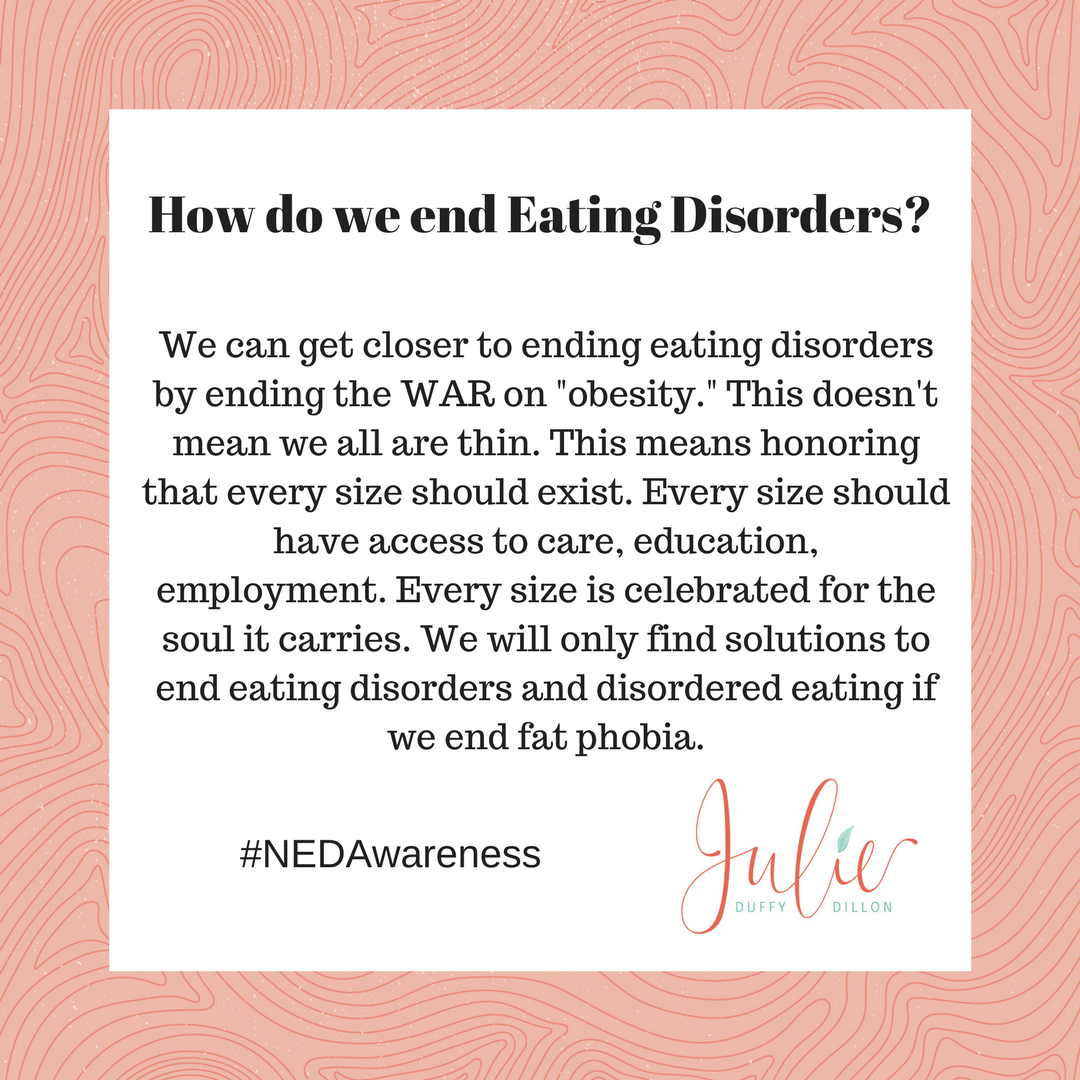While reading my Instagram feed during National Eating Disorder Awareness Week, I have been inspired by the recovery conversations. I have seen memes, blog posts, and heard podcasts empowering us to advocate for the changes in how we view eating disorders.
Eating disorders don’t fit the stereotypes. I admit I used to recognize eating disorders in just thin white teen girls. Don’t make the same mistake!
Eating disorders come in all sizes, all genders and gender identities, all ethnicities, and all backgrounds. You cannot tell if someone is experiencing an eating disorder by looking at someone.
Never.
I met with my first client affected by an eating disorder in 1999. Since then modern science has been able to connect so many dots to allow us to better understand eating disorders.
Here’s what we know:
- there is a genetic link to eating disorders. Just like someone with a genetic predisposition for alcoholism avoiding alcohol, those with certain genetic traits should avoid certain behaviors to help avoid setting themselves up for an eating disorder. Does this guarantee no eating disorder will occur?? No and it does set up a protection from it and brings down the likelihood.
- Which behaviors should be avoided? Dieting, pursuing weight loss, and/or manipulating food to promote weight outcomes. Diets have been found in research to predict eating disorder behaviors.
- While not everyone who diets gets an eating disorder, diets set a person up for metabolic long term consequences like high cholesterol, high insulin, high blood sugar, and high triglycerides. These consequences are connected to weight cycling, that yo-yo effect from going on a diet and losing weight, then regaining the weight, then dieting again.
- Most people experience some sort of disordered eating because of diet culture. We are taught at an early age that fat is bad and we should eat to avoid it all costs.
I like to imagine a world free of eating disorders and disordered eating. Imagine everyone experiencing this earth free from food and weight worries? Imagine what we would do if we didn’t have to worry about our weight, or what we would eat and not each day?
Imagine how much shit we would get done.
While we are dreaming, let’s work back a bit toward reality. What would be different in this eating disorder free world? What could we bring from this dream land to make it more like our current world?
I know what would be different.
We would no longer be fighting obesity.
We would not consider certain bodies “an epidemic” with billions emptied into eradicating these bad bodies.
We would no longer make judgements based on sight to predict health, intelligence, and worth.
Tap. Tap.
I need to check into your dream world for a second. Let’s be sure we are on the same page.
Be sure to note this dream world is NOT full of skinny people.
It is not full of people with BMIs of less than 25. or 30. or 40.
This lower BMI world is still FULL of eating disorder. More disordered than currently.
No longer fighting obesity to end eating disorders doesn’t mean no more fat people.
No longer fighting obesity means we catch up with science and decency:
No longer fighting obesity means we stop fighting bodies.
No longer fighting obesity means we honor size diversity.
No longer fighting obesity means appreciating health comes in every size.
And every size should exist. Every size should have access to care, education, employment.
Every size is celebrated for the soul it carries.
We will only find solutions to end eating disorders and disordered eating if we end fat phobia.
Why?
- Making size a moot point will eliminate the need for diets. Eliminating the need and industry for diets will prevent those with the genetic predisposition for an eating disorder from as easy access to the pathology.
- Recovering from an eating disorder means abstaining from diets. How can one abstain from diets when culture dictates that dieting is normal eating or pursuing weight loss is healthy? With diets no longer in style, healthy eating will include eating for self-care, variety, and satiety.
- Fear of gaining weight is a significant part of the eating disorder experience. Unfortunately, our world normalizes and justifies this fear because of health misinformation, confirmation bias, and fat phobia. Eliminating this cultural fear of fat will help those recovering to do the same. Honestly, I cannot imagine anyone able to recover from this part of their eating disorder until this is eradicated.
- Many people have a body who’s preferred weight is higher than the cultural norm. Try recovering from an eating disorder yet your eating disorder team says your weight is too high? Huh?? Yes it happens and way too often. Fat phobia within the eating disorder field is abundant and this prevents those needing to be at a higher weight from full recovery.
There are more reasons and time is short while I type this. I want to push publish before I pick up my kids from school 🙂 So I am leaving this incomplete until I can add more. Maybe you want to add more too? Shoot me an email (julie@juliedillonrd.com) and I will add yours, crediting your thoughts. ✌🏾





